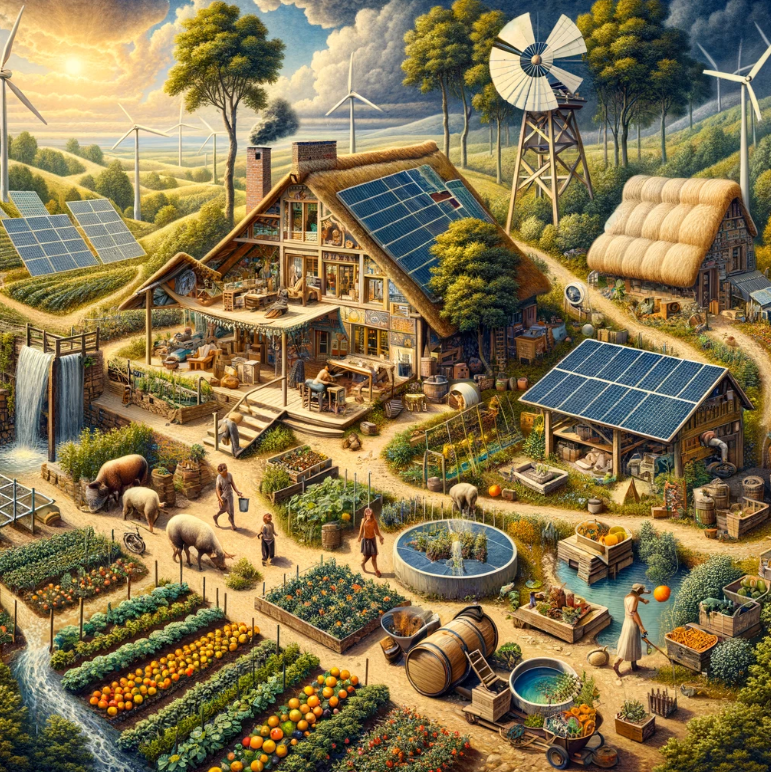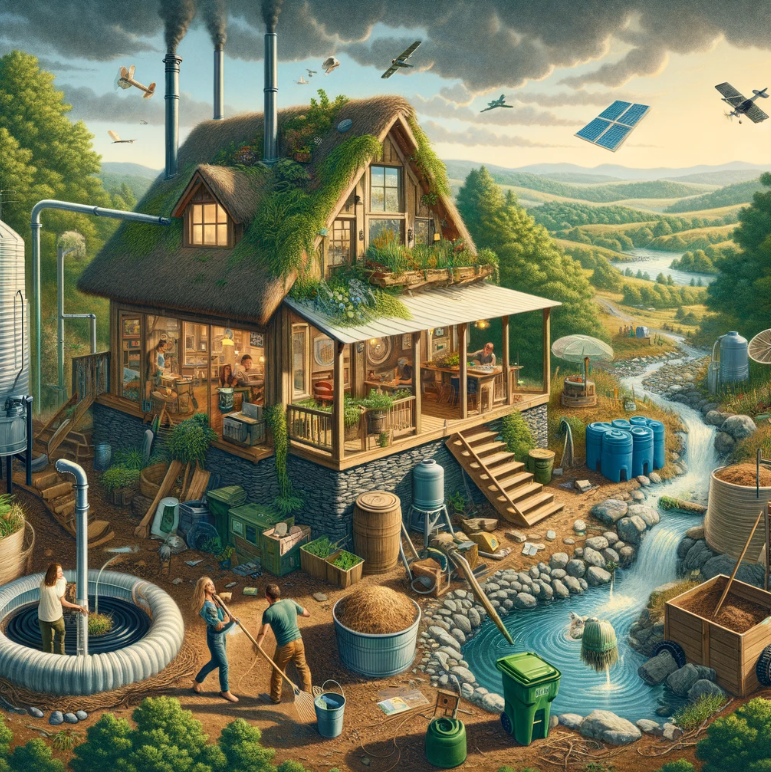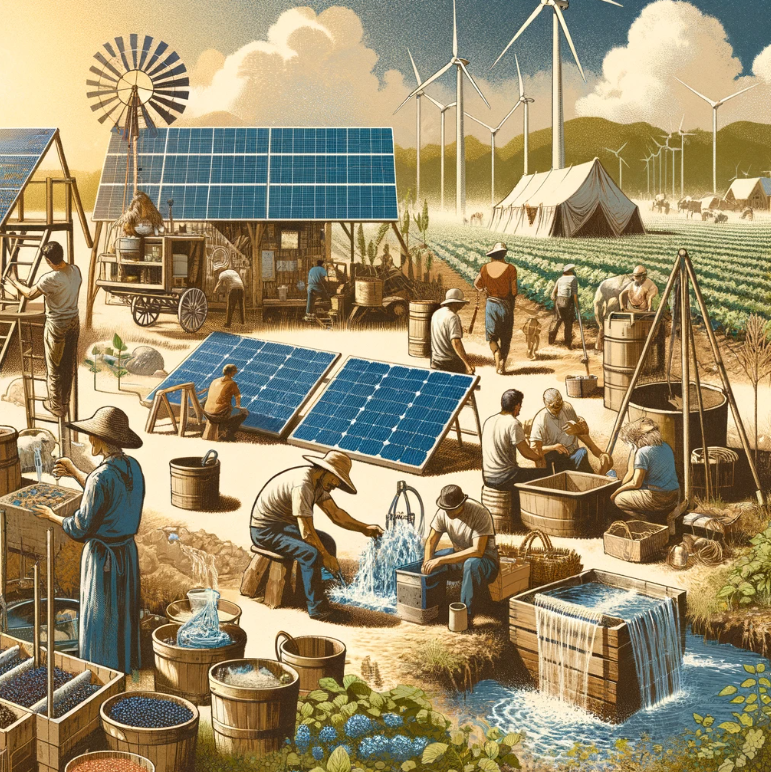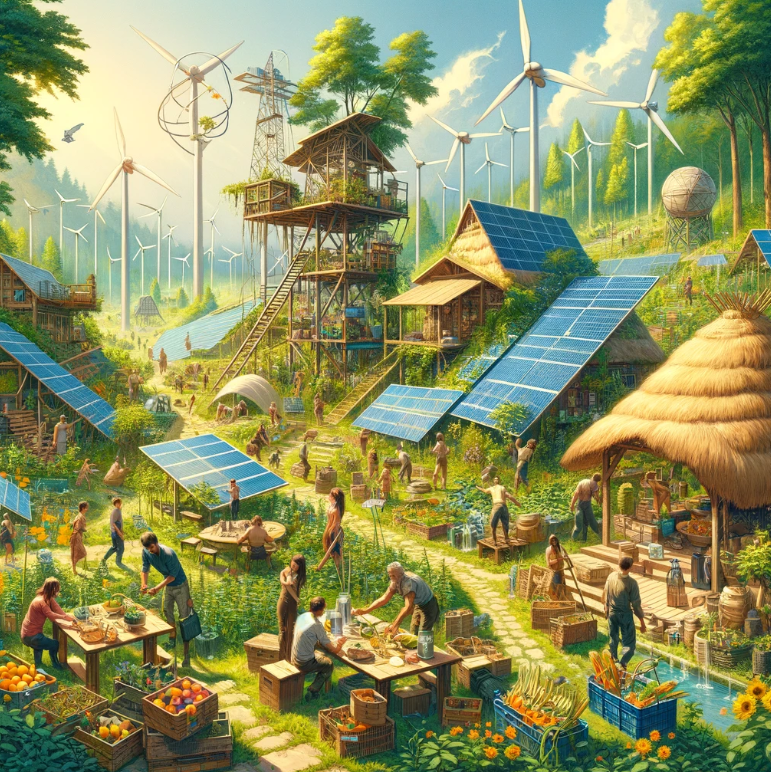Table of Contents
- 1 Introduction to Off-Grid Living
- 2 Understanding Off-Grid Living
- 3 Key Components of Off-Grid Living
- 4 Sustainable Prepping Strategies
- 5 Sustainable Survival Techniques for Off-Grid Living
- 6 Closing Thoughts on Off-Grid Living
- 7 Frequently Asked Questions
- 7.1 What is the significance of embracing an off-grid lifestyle for preppers and survivalists?
- 7.2 How does understanding off-grid living benefit individuals interested in preparedness?
- 7.3 What are the key components that define an off-grid lifestyle?
- 7.4 How can one implement sustainable prepping strategies within an off-grid lifestyle?
- 7.5 What sustainable survival techniques are recommended for individuals residing in an off-grid setting?
Views: 0
Introduction to Off-Grid Living
Brief Overview of the Off-Grid Lifestyle

Living off-grid involves being self-sufficient without relying on public utilities. Off-grid living offers freedom from traditional power sources such as electricity grids and promotes producing your own affordable renewable energy. This is good for family prepping on a more affordable basis. To embrace this lifestyle, careful planning, efficiency, and resource management to reduce environmental impacts, cost, and energy use are essential.
For preppers and survivalists, off-grid living holds significant importance. Preppers value it for its self-reliance during emergencies, ensuring they can sustain themselves independently. Being disconnected from public utilities provides a sense of security in times of crisis or disaster by having alternative resources available.
Importance for Preppers and Survivalists
Embracing the off-grid lifestyle allows preppers, survivalists, and communities to develop essential skills necessary for self-sufficiency in challenging situations. By living off-grid, people in these communities learn how to generate their own electricity through renewable sources like solar panels or wind & water turbines.
Understanding Off-Grid Living
Off-grid living entails operating independently from public utilities, emphasizing sustainability, self-sufficiency, and minimal environmental impact. The primary goal is to reduce reliance on external resources. This lifestyle choice involves people generating power through renewable sources like solar panels or wind turbines.

Living off-grid offers several advantages for preppers and survivalists. During emergencies or societal disruptions, individuals can ensure access to basic necessities such as food, water, and shelter. By embracing an off-grid lifestyle, preppers and survivalists enhance their resilience and adaptability in challenging situations. Being off-grid provides greater control over one’s destiny by fostering independence from external systems.
Embracing the off-grid lifestyle enables individuals to cultivate essential skills for self-reliance in various scenarios without relying on traditional infrastructure or services. It encourages a proactive approach to preparedness by promoting practices that prioritize long-term sustainability over short-term convenience. For example, learning how to grow food sustainably becomes crucial for ensuring a stable food supply during times of scarcity or crisis.
One key principle of off-grid living is the emphasis on minimizing waste generation and adopting eco-friendly practices wherever possible. This includes strategies such as composting organic waste materials to enrich soil quality or using rainwater harvesting systems for water conservation purposes. These practices not only reduce environmental impact but also contribute to creating a more self-sufficient living environment conducive to long-term survival.
Benefits of Embracing Off-Grid Living:
- Ensures access to basic necessities during emergencies
- Enhances resilience and adaptability in challenging situations
- Provides greater control over personal destiny
Core Principles of Off-Grid Living:
- Sustainability
- Self-sufficiency
- Minimal environmental impact
Key Components of Off-Grid Living
Renewable Energy Sources

Off-grid living for preppers and survivalists involves utilizing renewable energy sources like solar power systems. These systems harness the sun’s energy through solar panels, ensuring a reliable electricity source. Another essential renewable energy option is wind turbines, which convert wind into power, enhancing an off-grid system’s energy production capacity.
Hydropower presents another viable option for off-grid living, using flowing water to generate electricity. Implementing small-scale hydropower systems in areas with access to running water ensures a consistent and reliable energy source.
Water Sourcing and Purification
For self-sufficiency in water supply, off-gridders rely on methods such as rainwater harvesting and groundwater wells. Rainwater collection provides an independent water source while reducing dependence on municipal supplies. Groundwater wells tap into underground sources, offering sustainable and clean water with proper maintenance.
Water purification techniques like boiling, filtration, and chemical treatment are crucial for ensuring the safety of off-grid water sources. Water storage solutions using tanks or containers help meet water needs during dry spells or emergencies effectively.
Food Self-Sufficiency
Achieving food self-sufficiency in off-grid scenarios involves various strategies like gardening techniques focusing on sustainability. Methods such as permaculture and raised beds maximize yields within limited spaces while providing a self-sufficient food source.
Raising livestock offers meat, dairy products, and eggs sustainably with suitable shelters and nutrition considerations being vital aspects to consider. Foraging wild edible plants from the environment along with hunting provide additional protein sources requiring knowledge of local flora/fauna.
Sustainable Prepping Strategies
Building a Sustainable Shelter
Energy-efficient materials and designs are essential for minimizing energy consumption in off-grid homes. For instance, incorporating insulation into the construction helps maintain comfortable indoor temperatures while reducing the need for excessive heating or cooling. Passive solar design utilizes natural sunlight to warm up living spaces, decreasing reliance on artificial heating sources.

Moreover, efficient appliances further contribute to energy savings by consuming less power.
Off-grid living encourages sustainable building practices that prioritize environmental impact reduction. By choosing eco-friendly materials and implementing energy-efficient designs like proper sealing of windows and doors, individuals can significantly lower their carbon footprint. These practices not only align with sustainability goals but also promote self-sufficiency in managing resources efficiently.
Off-Grid Living Waste Management Practices
Composting plays a vital role in off-grid living by converting organic waste into nutrient-rich soil amendments for gardening purposes. This process not only reduces waste but also eliminates the need for chemical fertilizers, supporting sustainable agricultural practices. Embracing composting aligns with the principles of self-reliance and resourcefulness commonly associated with off-grid lifestyles.
In addition to composting, adopting recycling and reuse habits is crucial for minimizing waste production in off-grid communities. Recycling materials conserves resources by giving them a new life instead of ending up in landfills unnecessarily. Likewise, reusing items extends their usability period, reducing the demand for new purchases and promoting a more sustainable lifestyle choice among preppers and survivalists.
Emergency Preparedness
Stockpiling essential supplies is key to ensuring emergency preparedness during crisis or disruptions when living off-grid as preppers or survivalists. Items such as non-perishable food, water storage solutions, medical supplies including medications should be part of every well-prepared individual’s inventory list to sustain themselves during unforeseen circumstances effectively.
Medical emergencies can arise at any time; hence having a comprehensive first aid kit readily available is critical when residing off-the-grid as it may take longer to access professional medical assistance due to remote locations common among such communities. Keeping emergency preparedness kits on hand is a good idea.
Sustainable Survival Techniques for Off-Grid Living
DIY Renewable Energy Projects

Embracing the off-grid lifestyle involves essential survival skills like creating renewable energy sources. For instance, installing solar panels efficiently captures sunlight for power generation. Professionals can ensure optimal performance of these systems by positioning them correctly on rooftops or ground-based structures.
Constructing wind turbines requires knowledge of electrical and mechanical components to harness consistent wind flow effectively.
Building a DIY water filter using activated charcoal and sand is crucial for off-grid living. This filtration system removes impurities from water, making it safe to drink without relying on external resources. Safe storage practices are essential in maintaining supplies in an organized, dry, and accessible manner to prevent spoilage or damage during emergencies.
Water Filtration Systems
Constructing a DIY water filter provides an affordable option for off-grid enthusiasts seeking sustainable living solutions. Moreover, implementing organic gardening techniques such as crop rotation helps maintain soil health while maximizing garden productivity through companion planting methods that enhance plant growth naturally. Natural pest control strategies like encouraging beneficial insects and birds promote ecological balance within off-grid gardens.
Closing Thoughts on Off-Grid Living
Embracing the off-grid lifestyle for preppers and survivalists involves understanding the key components of sustainable living while integrating effective prepping and survival techniques. By comprehending the essence of off-grid living and adopting sustainable practices, individuals can enhance their self-reliance and resilience in various scenarios.

To thrive in an off-grid setting, one must prioritize sustainability, resourcefulness, and preparedness. By implementing sustainable prepping strategies and survival techniques tailored to off-grid living, individuals can navigate challenges effectively. Embracing this lifestyle empowers individuals to forge a deeper connection with nature, cultivate essential skills, and build a robust foundation for self-sufficiency. As you delve further into the realm of off-grid living, explore innovative solutions, refine your strategies, and embrace the transformative journey towards self-reliance and preparedness.
Frequently Asked Questions
What is the significance of embracing an off-grid lifestyle for preppers and survivalists?
Living off-grid allows preppers and survivalists to be self-reliant, reduce dependency on external resources, and prepare for emergencies or disasters with sustainable strategies. It can also help prepare you for times of Economic Uncertainty!
How does understanding off-grid living benefit individuals interested in preparedness?
Understanding off-grid living provides insights into resource conservation, alternative energy sources, self-sufficiency skills, and resilience building crucial for prepping and survival scenarios.
What are the key components that define an off-grid lifestyle?
Key components include renewable energy sources like solar power, water management systems such as rainwater harvesting, sustainable food production methods like gardening or livestock rearing, waste management practices, and overall self-sufficiency measures.
How can one implement sustainable prepping strategies within an off-grid lifestyle?
By focusing on long-term food storage using preservation techniques like canning or dehydration, cultivating a diverse garden for fresh produce year-round, learning essential first aid skills alongside traditional herbal remedies – all while minimizing waste generation through recycling efforts.
What sustainable survival techniques are recommended for individuals residing in an off-grid setting?
Learning primitive skills such as fire-making without matches or modern tools; mastering water purification methods from natural sources; honing hunting/trapping abilities for sustenance; practicing shelter-building with local materials; acquiring knowledge of wild edibles/medicinal plants – all contribute to successful survival in an off-grid environment.




